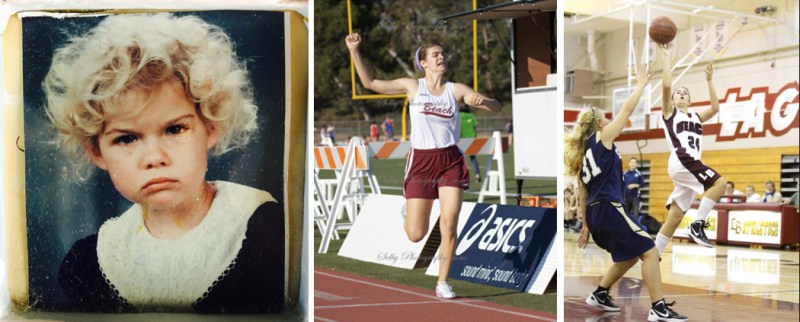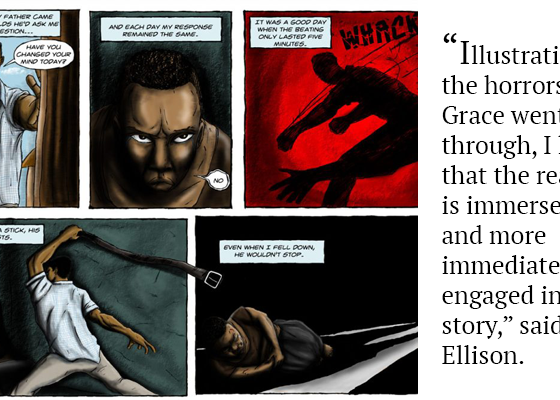The first time I stepped onto a sports field, I had just turned 6 years old.
My parents always knew I wanted to play sports, so they signed up me for a recreational soccer league in Redondo Beach, California.
I was ecstatic.

I felt honored to have been selected to play on the Pink Cadillacs, and I even remember smiling for my first team picture with a tight grip on my soccer ball.
Every year, I would beg my mom to sign me up for another sport, so she signed me up for basketball, cross-country and even boys’ tackle football.
I always felt strong playing sports, and after every game I would walk away feeling good. While some people told me that I would never be as successful at sports as men, my parents knew I could do whatever I put my mind and heart to.
In fourth grade, I began to acquire another habit, my mom says.
“You would constantly be walking around the house holding a hairbrush that resembled a microphone,” she says. “You would pretend to be reporting live for CNN.”
“CNN? Not ESPN?” I still find it funny, because I have never had an interest in politics.
That’s when the bullies came after me
School continued to get harder.
They teased me because I was a tomboy, dressing for a soccer match. I was always trying to play in the “boys only” games, trying to fit into a group that never wanted to accept me.
Also, my hair looked like a poodle or, on a good day, Napoleon Dynamite’s hair: curly and blonde.
Unfortunately, the bullying continued through middle school, and the constant put-downs about my abilities haunted me. The message was clear: I could not and would not accomplish anything great in sports or elsewhere because I was born female.
High school got better
At home, my parents and I often discussed how difficult it is to be female today.

When I was a freshman in high school, I began competing in cross-country, track, basketball and soccer, and I started to gain the respect of the boys. They gave me compliments rather than putdowns, something that had rarely happened in elementary and middle school.
One day during my sophomore year in high school, I went to the gym in my neighborhood and hopped on the elliptical. Working out often clears my head, and I leave feeling like a new person.
I turned on the tiny television screen that was mounted on the elliptical machine, and I saw a sports anchor recapping a football game. He captured my attention.
After I left the gym that night, I realized that a greater power had decided my future: I knew I wanted to become a sports reporter.
Heading to a Pac-12 school
When I graduated high school, I had no journalism experience but I was ready to start studying it. I also decided to leave my home state of California and attend the University of Colorado Boulder.
A Pac-12 school filled with competitive sports and opportunity was the perfect fit for a future sports journalist.
During my freshman and sophomore years, I was doing anything I could to get experience in journalism: taking basic journalism classes, speaking on college entertainment podcasts, writing for the CU Independent and more.

Two years ago, a classmate and fellow sports enthusiast suggested that I reach out to Curtis Snyder, the director of digital strategy for the University of Colorado Boulder’s athletic department.
Even though we had never met, I knew I needed to email him. I did wonder if he would reject me right off the bat.
“Will he see that I am a woman and treat me like the boys did in secondary school?”
Although I now have female role models like SportsNetLA’s Kelli Tennant and FOX Sports’ Jenny Taft, I didn’t know any other women trying to break into sports journalism when I started college.
But I figured I had nothing to lose by reaching out. I sent Mr. Snyder a brief note about my love of sports along with my resume, which I thought would scream “inexperienced.”
After a couple of weeks passed, I had still not heard anything and I was losing hope. “Maybe those boys in middle school were right,” I thought, “that girls have no place in this male-dominated industry.”
Nabbing that first great internship
Shortly thereafter, Mr. Snyder responded to my email, saying he would love to offer me an internship. Apparently, he saw that I was hard working and I love everything about sports.
This past year has been the hardest and most fulfilling year of my life.
Now, I host three sports shows on my college athletic television network and CU athletic social media channels. I continue to work alongside Mr. Snyder with the CU football team, and I work with the Denver Broncos public relations staff during home games.
Every single day is a challenge, and I am often working way out of my comfort zone in a male-dominated profession. I’ve had one man accuse me, repeatedly, of not knowing enough about the team I was covering and another one send inappropriate text messages. However, I know there is no growth in the comfort zone and no comfort in the growth zone.
When I make mistakes, I no longer say “sorry.” Whether it’s getting the details of a play wrong or mispronouncing someone’s name, I say I am going to do better. Now I believe that my mistakes have helped me grow into the person I am today..
Now those naysayers inspire me
There have been men who have told me I should change careers, saying that I am not good enough and very well may never be because I am a woman. I remember who they are, and they inspire me to do the things they thought I could not.
Now I know they’re wrong. When I walk into a press box to work a football game, or onto a sports field or court to interview a player, I hold my head up high knowing that I am worthy of being treated with respect, no matter what I hear from others.
Although being a woman in sports journalism is hard, I know that giving up on my dream would be harder. I want to be the change I want to see in the sports journalism industry.







You must be logged in to post a comment.